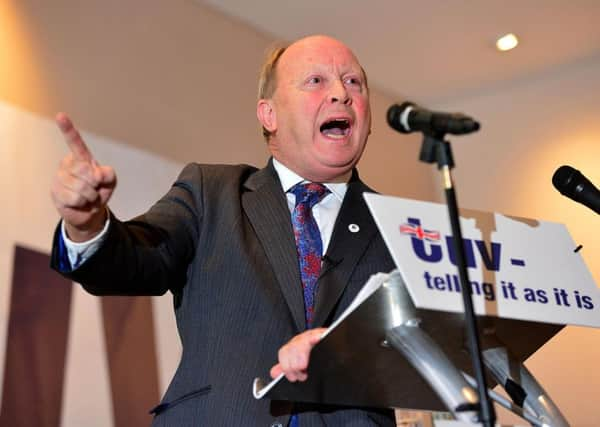'˜Politically charged' remarks from judge on Troubles hearings


TUV leader Jim Allister said Lord Justice Weir “went too far” when accusing the ministry of having money to fight wars and buy submarines, while blaming a lack of resources on delays in disclosing information.
Yesterday, Lord Justice Weir slammed the MOD over missed deadlines for disclosing classified papers to the coroners’ courts, saying the hearings were “obviously very low” on their list of priorities.
“The MoD is not short of money,” he said.
Advertisement
Hide AdAdvertisement
Hide Ad“It’s busy all over the world fighting wars and it’s about to buy some new submarines with nuclear warheads - so it’s not short of money. ”
Judge Weir is conducting a review of more than 50 long-delayed inquests relating to the Northern Ireland Troubles.
Lord Chief Justice Sir Declan Morgan has asked Judge Weir to assess the 56 stalled cases, relating to 95 deaths, to determine why they are still stuck in the coronial system, in some instances almost 45 years after the deaths.
Many of the delayed probes involve killings carried out by the security forces.
Advertisement
Hide AdAdvertisement
Hide AdOn the ninth day of the two-week exercise in Belfast’s Laganside Courts, Judge Weir examined the cases of seven IRA men shot by the SAS in two separate ambushes in the early 1990s and the shooting of Belfast father-of-six Patrick McVeigh by the Army’s secretive Military Reaction Force (MRF) unit in 1972.
Mr Allister said: “The judge’s intemperate and politically charged comments are inappropriate.
“Of course he is entitled to give relevant directions, but it is no part of a judge’s role to enter the arena with political comments about the policy direction of the MOD and our nation’s involvement in ‘fighting wars’ or pursuit of Trident.
“In this he went too far and endangered public confidence in the non-political independence of the judiciary.”
Advertisement
Hide AdAdvertisement
Hide AdDuring his assessment of the MOD’s track record, Judge Weir made clear the holding of investigations was not “optional”.
He said: “It’s not like buying a new Jeep or getting a new regimental mascot. This is not an option - this is an international obligation on the State.”
He said the MoD argument that it was under resource pressure raised questions over the Government’s commitment to its obligations under international human rights laws.
“It doesn’t suggest any great intent on the part of Government to comply with their obligations,” he said.
Advertisement
Hide AdAdvertisement
Hide AdHe told a lawyer from the MoD: “You want to avoid any suspicions that this approach is designed to prevent the matter being aired in a public arena, that it’s a deliberate attempt to delay and obfuscate - you want to avoid people thinking that. The best way to do that is let people see what you have got.”
Yesterday, an MOD spokesman said it “goes to considerable lengths to support legacy inquests” and added: “The department remains committed to working with coroners to ensure that all information held by the MOD is accessible to the court.”